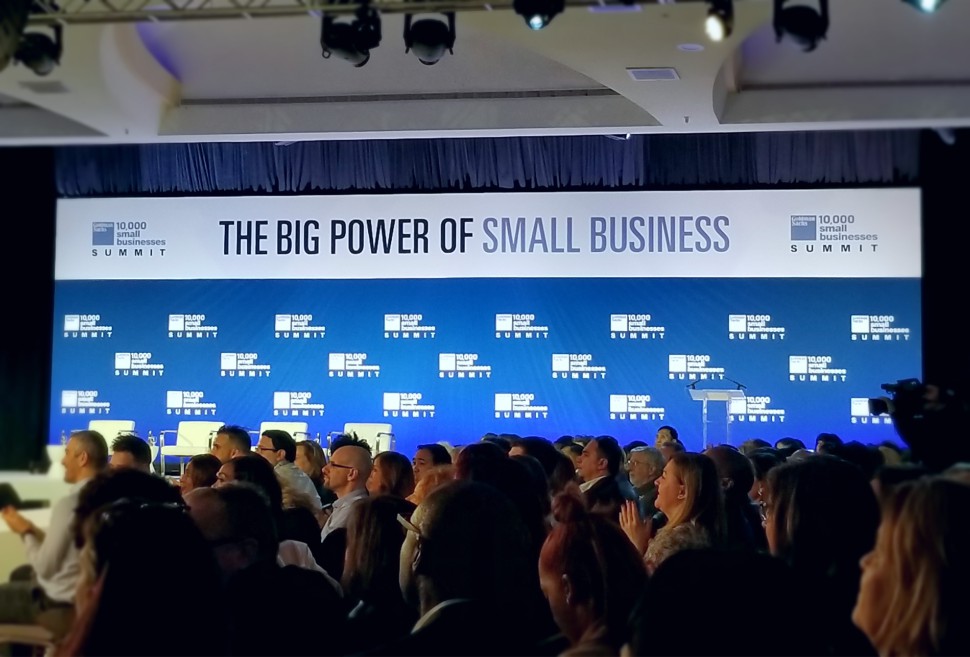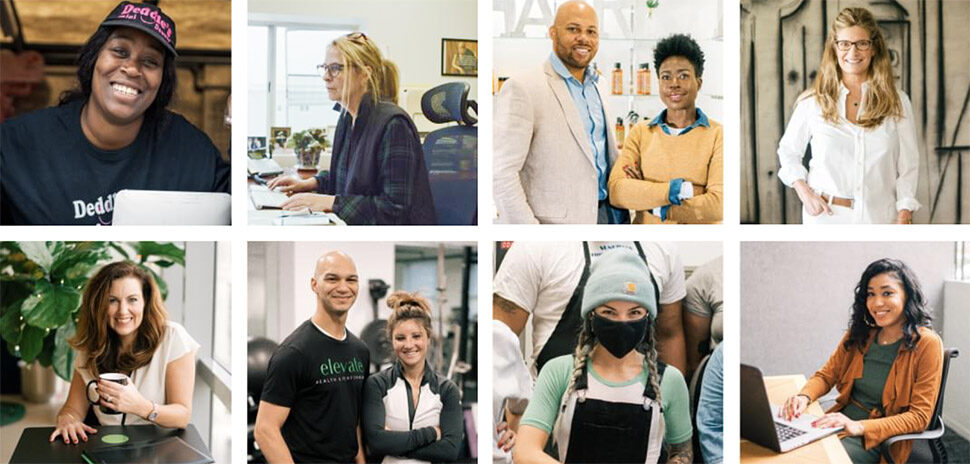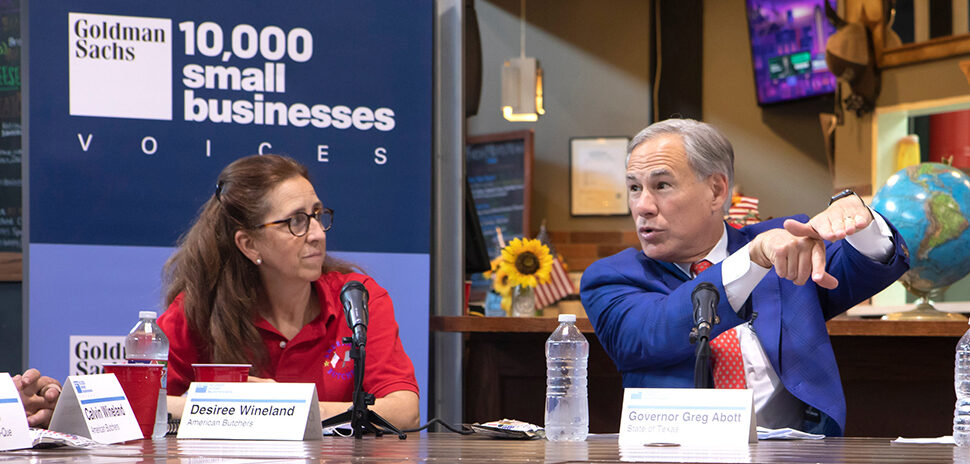![]() The tweet, “The energy in this place is intoxicating!!!!,” doesn’t even begin to describe the energy of what happens when you bring together 2,200 entrepreneurs from across the country at Goldman Sachs 10,000 Small Businesses’ first-ever Alumni Summit held recently in Washington, DC.
The tweet, “The energy in this place is intoxicating!!!!,” doesn’t even begin to describe the energy of what happens when you bring together 2,200 entrepreneurs from across the country at Goldman Sachs 10,000 Small Businesses’ first-ever Alumni Summit held recently in Washington, DC.
Sondra Brunone, a graduate of the Dallas 10,000 Small Businesses program, felt that magnetic energy everywhere she went from the moment she stepped into the conference hotel until the moment she left the two-day event.
“Even though I’d never met 99% of the business owners at the Alumni Summit, the spirit of collaboration was incredible. Literally, when I walked in the door of the hotel with my suitcases in hand — there were hundreds and hundreds of impromptu networking groups in full swing right there in the lobby,” said Brunone, president and co-founder of Audio Dawg.
“I met people I’ll be doing business with in elevators, in hallways, in the ladies’ room, and even at the water station in the back of the live event.”
Stronger Together: We Are All On The Same Team
The Summit: The Big Power of Small Business was focused on charting a path to help small businesses grow and compete successfully.
“I participate in local business groups and know plenty of small business owners outside of the 10,000 Small Businesses program. But, there is something very, very different about being a part of this group,” Brunone said.
“It is just a given that we are all willing to help each other, advise each other and to share resources with each other. There’s an energy that doesn’t exist in other networking-focused groups. I think it has to do with the fact that we all put in the effort and worked really, really hard to conquer this program. And we have great respect for each other.”
“There’s an energy that doesn’t exist in other networking-focused groups. I think it has to do with the fact that we all put in the effort and worked really, really hard to conquer this program.”
At the Summit participants heard from industry leaders and experts about optimizing business growth through candid chats chalked full of lessons on leadership. Alumni heard everything from best practices for effective hiring and accessing capital, to strategy and learning to let go, to leveling the playing field through customer engagement.
More than 120 DFW alumni attended the national Summit and walked away with five invaluable takeaways of how to unleash the “Big” power of small business.
Focus, Advocate & Innovate For Growth
In the Summit opening session, small businesses were praised for not only being the fuel and backbone of the U.S. economy, but for collectively employing over 60 million people — half of the U.S. workforce.
“That’s an amazing amount of untapped power,” Chanel Davis, president of Davis, Davis & Harmon LLC said, reflecting on the impact that the 2,200 entrepreneurs in that room could have on the future and on Capitol Hill over the next two days.
“Entrepreneurship and political activism go hand-in-hand. As business owners, we must lobby our congressman to create laws that support the growth of small businesses.”
The thought that small business is the future of America was not lost on Hussain Manjee, president and CEO of DHD Films. As a small business owner he believes it is his responsibility to “be methodical about the future. Many of us entrepreneurs need to remember, what got us here, won’t get us there! We need to constantly be innovating on our processes, products, and path to market.”
Lesson One: Failing Forward
“One common phrase throughout the summit was about ‘failing’ and how failure is only a failure if you do not get up,” said Ted Hill, president of Life Benefits, on the seasoned lessons of failing as told by Sara Blakely, founder and CEO of Spanx Inc.; Tyler Perry, founder of Tyler Perry Studios; and Mori Taheripour, faculty member at the Wharton School at the University of Pennsylvania.
Spanx creator Blakely spoke about a memory of her father growing up. She claimed that her father praised her seeming failures, encouraging her to take risks. Life Benefits president Hill appreciated this wisdom, saying that “taking risks is an adventure. Believe in yourself and enjoy the ride. We live in wonderful time that allows us all to create and build our dreams. Don’t let anyone take that away from you.”
Tyler Perry openly discussed his failures and lessons learned in his 25-year entrepreneur journey.
“His words resonated with me in such a profound manner. When you’re an employee in Corporate America and make mistakes, you ask for forgiveness, chalk it up to a developmental opportunity, and move on,” said Pamela Hardy, managing director of AKIDA Consulting Group, LLC.
“However, when you make a mistake as an entrepreneur — a business owner, you judge yourself harshly and feel that one error will be the downfall to everything you’ve built, rather than viewing it as a learning opportunity and commit to do better next time.”
To minimize failure, Mori Taheripour advised us to “always be prepared,” Hill stated. “Do the work to be ready at all times. So when the opportunity hits, you are ready for success or failure and you will be able to keep moving forward through either experience. Keep moving forward, always be learning, and be your own safety net.”
Similarly, Maggie Escobar, owner of Nuevo Leon Mex-Mex Restaurant & Delicart and relative of Richard Branson, founder of Virgin Group, said, “once you feel you can do it, you will do it again and again and again. Learn by doing it and falling over.”
Lesson Two: The Founder Holds the Power of Letting Go
Lisa Price, founder of Carol’s Daughter, inspired alumni Alicia Makaye, vice president of GXA Network Solutions, when Price said, “do not forget that you are the founder and no matter how much experience a consultant brings, they are collecting a check based off your idea.”
“This was inspiring because people around me try make me feel like I do not belong in the IT industry as a woman and definitely not as a woman-owned business even though my name is part of the company logo,” explained Makaye.
A resounding theme expressed and learned by all founders was the bigger you get, the more you have to let go. Learn to delegate, but never forget your business is your brainchild.
Valerie Mason Davis, CEO and managing member of The Mason Group Patent Specialists, got the letting go message loud and clear when Spanx CEO Sara Blakely said, “as soon as you can afford it, hire what you’re not good at and what you don’t like. You have to be able to delegate and let go of the reins if you’re going to scale.”
Lesson Three: Delight Customers
Alumni Pamela Hardy and Ted Hill also learned just how important customer service and customer experience really are and the difference between the two.
The difference, according to Hardy, was explained in Danny Meyer’s breakout session Shaking It Up: Stories of Success from a Disruptor. Meyer, CEO of Union Square Hospitality Group and the founder of Shake Shack, defined service as the technical delivery of your product or service, whereas customer experience or hospitality is how you make your customers feel when delivering your product or service.
Hill went on to summarize that when your customer service and customer experience work together, they delight the customer.
“Delight your customers with exceptional customer service. Trust your people to make decisions that will create a ‘first kiss’ type experience. Create a service platform that is unforgettable, unique, and puts the customer first. And ask the customer, is there anything we can do to make your life better?”
Lesson Four: Be Strategic
Valerie Davis learned from Harvard Professor Michael Porter that strategy is not about competing to be the best, it’s about how to deliver unique value to the customers you choose to serve. This is the core idea of all great strategies.
The leader is the chief strategist and good owners are strategy professors who teach strategy to their teams every day. It’s the highest calling.
Lesson Five: Women Are Driven and Innovative
As the father of a young daughter under 2 years old with her own “MINI CEO” t-shirt, Hussain Manjee was thrilled to see so many successful female entrepreneurs from all across the country attending the Summit.
“We know that there is a shortage of female CEOs in publicly traded companies in America, but to see so many successful entrepreneurial ventures in almost every industry imaginable represented by female leaders at this Summit is tremendous progress for our nation.”
The candid stories and experiences shared by powerhouse entrepreneurs Jo Malone, Lisa Price, Melanie Whelan and Sara Blakely about growing their companies and the challenges faced along the way emerged as some of the most inspiring moments of the Summit.
“What I learned from all of these amazing women is that you must be a disruptor to make an impact on your industry and to be a success in business,” stated Chanel Davis.
For Jennifer Henderson, president and founder of JO Design, the panel discussion on Growing Big, Thinking Big: A Tale of Disruption was especially inspiring as a woman-owned business because the women all spoke of their passion in starting their businesses.
“These women all had a problem to solve and found a way to make it a business. All of these women saw a gap in the marketplace, and filled it by sheer determination despite all the road blocks they hit,” she said.
The drive, innovation and determination of these powerful women who disrupted and defied the status quo was summed up best by alumni Valerie Davis: “the only limitations that we have are not based on our gender or any external characteristics we may have, but based on the limitations that we place on ourselves and on our business, in our own minds.”
The purpose of the Summit was to bring to life the Goldman Sachs 10,000 Small Businesses community and celebrate the vital role small businesses play in our economy. The 10,000 Small Businesses program aims to help entrepreneurs grow their businesses and create jobs by providing access to education, capital, and technical assistance. To learn more go here.
![]()
Get on the list.
Sign up to keep your eye on what’s new and next in Dallas-Fort Worth, every day.
One quick signup, and you’re done.
View previous emails.
![]()


![Dr. Justin Lonon, vice chancellor of Dallas College, addresses the crowd at the recent Goldman Sachs 10,000 Small Businesses Dallas Graduation. [Photo: 10KSB]](https://s24806.pcdn.co/wp-content/uploads/2021/06/GoldmanSachs-10KSB-4992-970-970x464.jpg)




![Barbara Bush, co-founder and board chair of the nonprofit Global Health Corps, right, in conversation with Shena Ashley, vice president of Capital One community impact and investment and president at the Capital One Insight Center. [Photo: Capital One Reimagine Communities Summit 2024]](https://s24806.pcdn.co/wp-content/uploads/2024/06/CO.BarbaraBushPhoto3RCS.2024-crop-75x69.jpg)

























